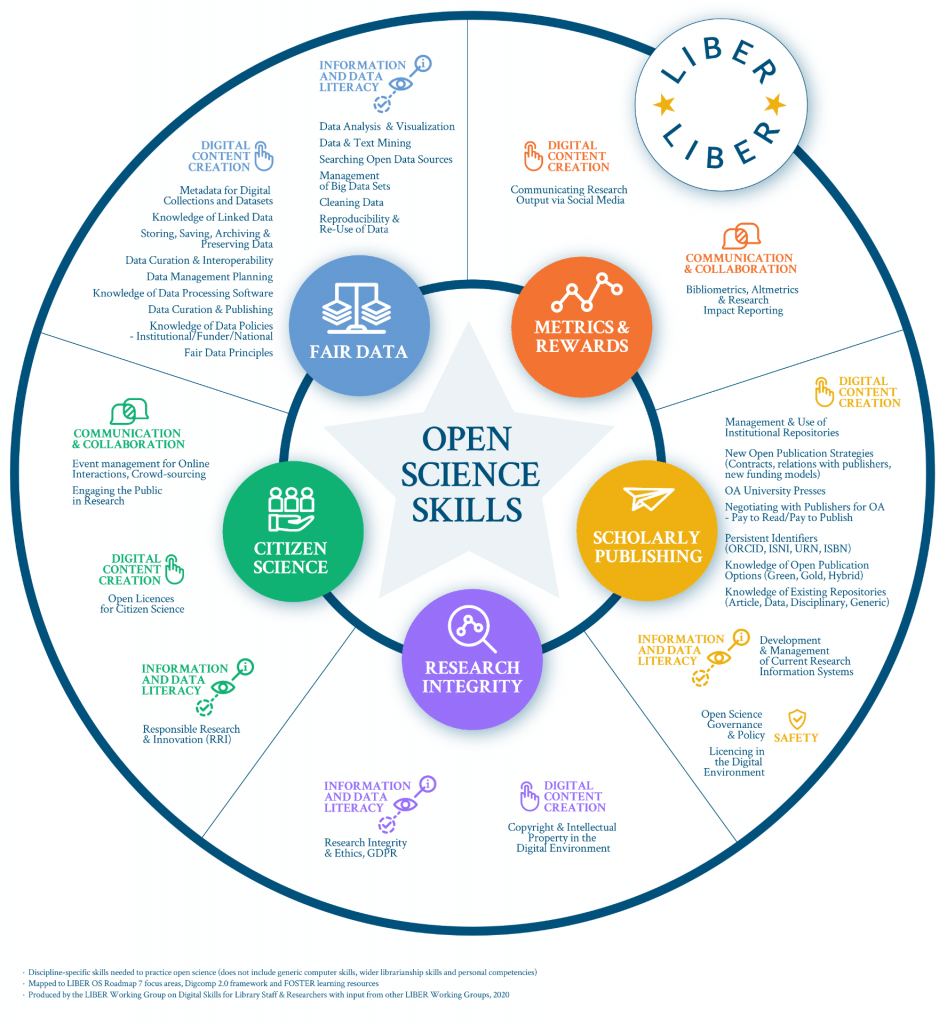This is a guest post from Nick Sheppard, Open Research Advisor at Leeds University Library
“Open Science is the practice of science in such a way that others can collaborate and contribute, where research data, lab notes and other research processes are freely available, under terms that enable reuse, redistribution and reproduction of the research and its underlying data and methods.”
https://www.fosteropenscience.eu/foster-taxonomy/open-science-definition
UKCoRR was founded as the UK Council of Research Repositories in 2007 and rebranded in 2019 as the UK Council of Open Research and Repositories. The intervening years have certainly been eventful. Culturally and politically, many aspects of British and global society would be virtually unrecognisable from the noughties side of Brexit, Trump and the (first) financial crash.
In a decade that has seen the Finch report and countless OA mandates from universities and research funding bodies, the scholarly communication landscape has also changed substantially. More research than ever is available online to be freely downloaded, read and reused (thanks in no small part to the unseen army of UKCoRR members!)
In 2020 research repositories are a crucial component of research infrastructure, underpinning not just open access to publications but open – or FAIR – data repositories and the broader concepts of open science – or open research and scholarship to be more inclusive of the humanities.
There is a growing awareness of the replicability crisis, with many published research results being difficult or impossible to replicate or reproduce, even by the original researchers. Simply freeing the final published article from its paywall, peer reviewed though it may be, is not enough. Open research goes beyond making publications open access and the underlying data available to encompass the entire research process, to make all aspects of the research cycle accessible.
Open research can also contribute to the impact of research and its broader contribution to society. It enables other organizations and the public to actively engage in knowledge production through collaboration and contribution of their own expertise, for example through citizen science projects.
As illustrated below (CC-BY, LIBER – click image for full size) UKCoRR members may find that the range of skills and knowledge required to support their academic communities are extending well beyond their traditional roles, encompassing research integrity, responsible metrics and open peer review to name but three. Then there are disciplinary differences in practice and culture, use of preprints, registered reports or preregistration. In the arts and humanities, open research may include sharing digital humanities methods and tools, notes, audio-visual materials and annotated bibliographies.
Is there a policy for that?
With the REF now just round the corner, it is a rare university that does not have a policy on open access, typically focussed on REF specific requirements. There is also, usually, an institutional policy for research data management.
The ongoing UKRI open access policy review aims to standardise policies across UKRI and is now described under the broad heading of open research emphasising transparency, reproducibility and research integrity as well as improving public value from research and innovation. Several other funders are also moving beyond open access and open data to an overarching policy on open research, including Wellcome and the European Union. Instead of a data management plan, Wellcome advocate an ‘outputs management plan‘ emphasising data, software and materials management.
Increasingly, universities, and especially their Libraries, are also promoting open research practices with several following the lead of the University of Reading in publishing a formal ‘position statement’ or policy:
- University of Reading Statement on Open Research
- University of York open research statement
- University of Cambridge open research position statement
- University of Manchester position statement on Open Research
- Loughborough University Open Research Position Statement
- UCL Statement on the importance of Open Science
- University of Surrey’s open research position statement
- University of Wolverhampton Open Research Statement
- University of Aberdeen Open Research Statement
- University of Dundee Statement on Open Research
- University of Sheffield Statement on Open Research
- University of the West of England, Statement on Open Research
- Northumbria University Open Research statement
- Birkbeck, University of London Open Research Policy
- De Montfort University, Leicester Open Research Position Statement
- Edge Hill University, Statement of support for open research
- Aston University Open Research Policies
- Newcastle University and Open Research, Institutional Position Statement
- Northumbria University, Newcastle, Open Research Statement
- Sheffield Hallam University, Open Research Statement
- University of Leeds Open Research Statement
- Liverpool John Moores Statement on Open Research
- Principles of Open Research at Lancaster University
- University of Glasgow, Code of Good Practice in Research
- Edinburgh Open Research Roadmap
- Francis Crick Institute Open Science Policy
- London School of Hygiene and Tropical Medicine Open Research Statement
The University of Edinburgh published an Open Research Roadmap in January 2022: https://www.ed.ac.uk/information-services/about/organisation/library-and-collections/open-research
University College London have gone one step further with their Office for Open Science and Scholarship organised around the 8 pillars of Open Science from LERU and interestingly also covering citizen science. They have also published a Statement on Transparency in Research.
Some institutions have run surveys or consultation exercises with public reports available from York, Surrey and Lancaster:
-
York Open Research: Summer 2020 awareness and engagement survey
-
Open Research Practice Questionnaire Report 2020; University of Surrey
- Open Research at Lancaster University
Many other universities have dedicated support information for researchers including Bristol, who have also awarded an Open Research Prize since 2021:
Glasgow have this neat video:
Events
Many universities have been running online events focussing on open research, with one of the (only) benefits of the Coronavirus pandemic being that they are often open to all and easy to attend from the comfort of your (home) office. Or you can catch the recording later. These are just some of the recent and upcoming events that are available online:
- University of York – Open Research launch event (June 2020)
- University College London – Launch of the Office of Open Science and Scholarship (October 2020)
- University of Leeds – Beyond Open Access: how, why and what’s next for open research at the University of Leeds (October 2020)
- University of Sheffield – Open Research Conversations (regular series of events. Materials posted here.)
- University of Manchester – Open Research Exchange (November 2020)
- Northern Collaboration: Open research learning exchange: Opening up Research (8 December – still time to register)
- Project OASE: Open access, preprints and research impact (10 December 2020 – still time to register)
UK Reproducibility Network
The other notable activity around open research that may be represented at a university near you is the UK Reproducibility Network (UKRN), a peer led consortium that promotes robust and reproducible research. While only a relatively small number of universities have formally committed to UKRN with a role within the senior management team, most universities do have an active local network. Planned future initiatives include developing common training across career stages, aligning promotion and hiring criteria to support open and reproducible research practices, and sharing best practice.
There may also be a ReproducibiliTea journal club run by early career researchers interested in building a local community around open and reproducible research. With COVID once again meaning these events have been running online, these are often open to the wider community and may be recorded. Check out the ReproducibiliTea online calendar for upcoming events.
- ReproducibiliTea podcast
-
Leeds ReproducibiliTea – Preregistering Qualitative Research (recorded 26 November 2020)
What next?
We’re still in the midst of a global pandemic which has itself brought to the fore the importance of rapidly sharing high quality data, models and code to inform government policy, not to mention develop vaccines – the virus genome was sequenced and made publicly available on 10 January 2020 (GenBank accession number MN908947). Preprints too have come of age with 6,771 posted on MedRxiv in the first 6 months of the pandemic, up from 807 in the previous six months, an increase of 739% (Besancon et al, 2020). There have been plenty of retractions however, sometimes too late to prevent a non-peer reviewed finding being picked up by the media and taking on a life of its own – the most (in)famous example being hydroxychloroquine – which illustrates the importance of scientific literacy. In the age of fake news and clickbait it is crucial that science is communicated responsibly, to avoid exaggerating research findings and to be clear on the review status.
Academia is still driven by ‘publish or perish‘ and Journal Impact Factor. The well publicised Wellcome survey from last year makes for sobering reading with researchers calling out unhealthy competition, bullying, focus on metrics, pressure to publish and for positive results. While there has been some progress, with more universities, funders and publishers signing up to the principles of the San Francisco Declaration on Research Assessment, research evaluation still relies excessively on metrics, often lacking nuance and emphasising story telling and problematic notions of ‘impact’, where Nature have recently announced a “landmark open-access option” of journal charges up to €9,500 to make research papers free to read(!)
University position statements or grass roots initiatives like UKRN and ReproducibiliTea are all very well, but there is a profound need for a cultural shift that emphasises collaboration over competition, that incentives open practise and rewards reproducible science. Who better to advocate for that change than UKCoRR members?


Comments are closed.